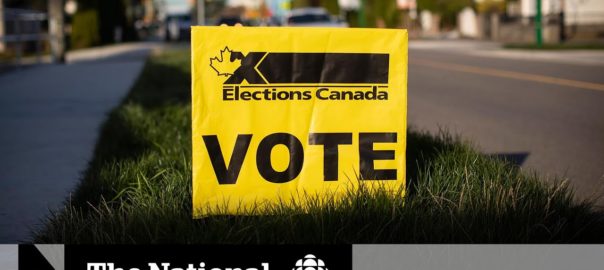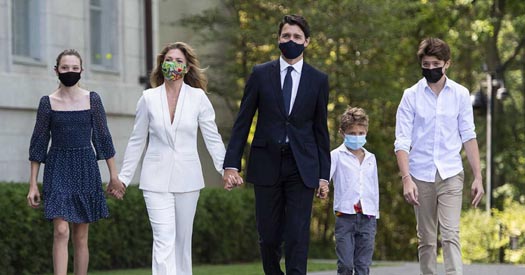 Justin Trudeau and his family visit Governor General Mary Simon at Rideau Hall
Justin Trudeau and his family visit Governor General Mary Simon at Rideau Hall
The latest public polling indicates that the race is tightening in #Elxn44.
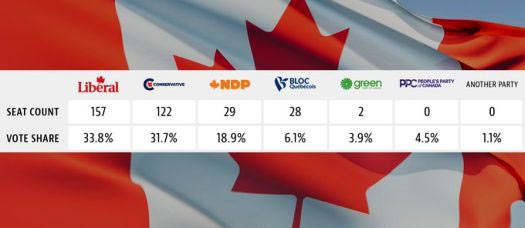
Don’t you believe it for one galldarn pickin’ minute, cuz it just ain’t so.
With a combined total of much more than $100 million in their coffers heading into the election, both Justin Trudeau’s Liberals and Erin O’Toole’s Conservatives had their party’s reliable, longtime pollsters conduct in-depth research into what seats each of the parties could hold, and which seats are up for grabs in this most contentious 2021 national Canadian election.
Conservative party apparatchik Jenni Byrne went into the current Canadian federal election bemoaning the fact that, according to the polling conducted for the Conservatives by her firm, Jenni Byrne + Associates, her beloved Tory party, the party she’s dedicated her life to, was mired at an all-time low of 27% popularity among a broad cross-section of Canadians.
“It’s not just that Erin O’Toole has brought the party to an historic low in the party’s popularity,” Ms. Byrne intoned in a recent Curse of Politics podcast, “he’s caused the party to reconsider what they’ve long believed to be their base, their core vote. When I worked with Stephen Harper, in the early days, our base constituted 31% of the Canadian population. After our minority win in 2006, the base for the Conservative Party grew to 33% — these were the reliable voters the Tories could always count on. All we had to do was add five points to our base, and as was the case in 2011, we would form a majority government in Ottawa.”
“Those days are long gone.”
“The Conservative Party has now lost the vote of women. Who’d have believed that Erin O’Toole and the Conservatives would have only 22% support among women voters? And as I’ve repeatedly pointed out on the podcast, the Tories have lost the support of the most reliable Conservative vote across the population — we’ve lost the vote of the seniors, the folks who actually get out and vote. The Liberals are eating our lunch among the seniors population, and those over the age of 50!”
“Unbelievable!”
After spending the past couple of days reporting out on the prospects of the federal Conservative Party in the current federal election — in a word, dire — today on VanRamblings we’ll report out on the results of the inside polling conducted by the Liberal Party of Canada. The Liberal party has identified 202 seats where their prospects for victory are the most salutary.
CBC | Battleground ridings across Canada the Liberals need to win to gain a majority
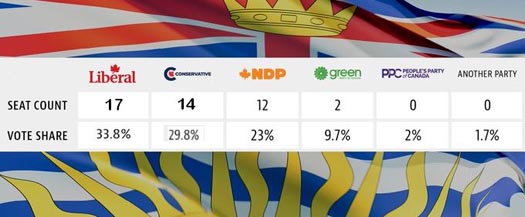 British Columbia | Liberals say they’ll win back 6 seats that gave them 17-seats in 2015
British Columbia | Liberals say they’ll win back 6 seats that gave them 17-seats in 2015
In British Columbia, the Liberals believe that they’re on track to winning six additional seats to the 11 seats they won in 2019, for a total of 17 seats — the same number of seats they won in the historic 2015 federal election.
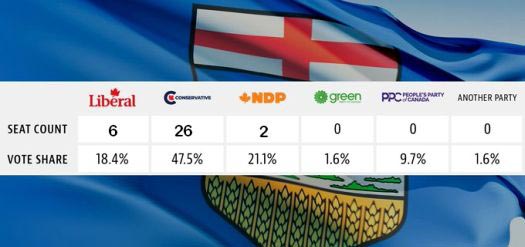 Alberta | Liberals are on track to win 6 seats, 4 in Redmonton, and 2 more in Calgary
Alberta | Liberals are on track to win 6 seats, 4 in Redmonton, and 2 more in Calgary
In Alberta, thanks to the historic unpopularity of Premier Jason Kenney, not to mention the splitting of the vote on the right, with the emergence of the Maverick Party and the anti-vaxxer / libertarian popularity of The People’s Party of Canada, even though Justin Trudeau was unable to convince retiring and popular progressive Mayors, Don Iveson in Edmonton, and Naheed Nenshi in Calgary, to run as Liberal candidates in the 2021 federal election, internal Liberal party polling projects a four-seat win in Edmonton (it’s not called Redmonton for nuthin’), and two more Liberal seats in Calgary — six more seats than the Liberals won in 2019, when the party wiped out across Canada’s most conservative, right-of-centre province.
The Liberals believe they can win six seats in Saskatchewan — where they lost their lone seat, in Regina, that of longtime party stalwart, Ralph Goodale, in 2019 — and in Manitoba, where they handily won four seats, a gain of two seats if that scenario comes to pass.
In western Canada, then, the Liberals believe they can pick up 18 seats over the results of the 2019 federal election, which gave them a minority government of 157 seats (170 seats is needed for a majority). If that scenario occurs, Justin Trudeau will have achieved his much sought after majority government. We’ll know sometime soon after September 20th, once the mail-in ballots have been verified & counted by Elections Canada.
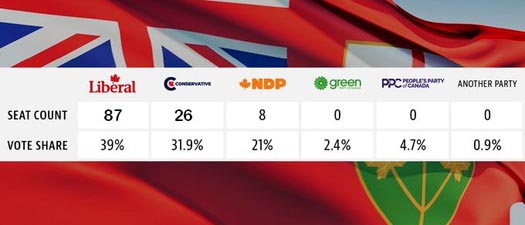 Ontario | The Liberals are wildly popular in the seat rich 905 & on track to win 87 seats
Ontario | The Liberals are wildly popular in the seat rich 905 & on track to win 87 seats
In Ontario, and particularly in the vote and seat rich 905 Metro Toronto region, where — thanks to the record unpopularity of Ontario Conservative Premier Doug Ford — Justin Trudeau and the Liberals believe they can gain at least 10 additional seats to the 77 seats they won in the province during the 2019 federal election. In the GTA, much to Jenni Byrne’s chagrin, the Liberals are sitting at 45.9% popularity, with the Tories & NDP tied at 26%.
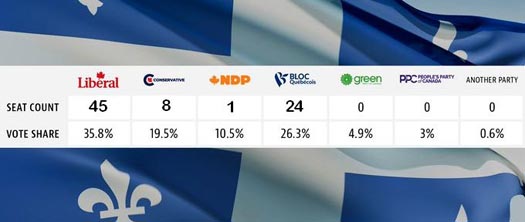 Québec | Justin Trudeau has the hometown advantage & is on track to pick up seats
Québec | Justin Trudeau has the hometown advantage & is on track to pick up seats
Meanwhile, in Québec, the Liberals believe they can increase their seat count — mostly in urban and suburban ridings in and around Montréal — from the 40 seats they won in 2019 to 45 seats in the current federal election, given that Mr. Trudeau has made Québec’s popular Premier, François Legault, his new best friend, a development that has caused much consternation in the Conservative and Bloc Québécois camps. C’est la vie.
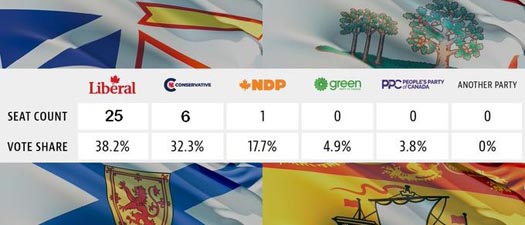 Maritimes | Nova Scotia, New Brunswick, Newfoundand & PEI spell victory for Trudeau
Maritimes | Nova Scotia, New Brunswick, Newfoundand & PEI spell victory for Trudeau
When the Conservatives win in a riding, they win big, their victory and vote count outsized (the same can be said for the B.C. Liberals). Despite a projected popular vote count in the 2021 federal election of 32.3% for the Conservative Party in the Maritimes (according to both Liberal and Tory pollsters), that popularity is focused on six rural ridings, and nowhere else.
Justin Trudeau and the Liberal party’s popularity in the Maritimes is widespread. Not for nuthin’ that Justin Trudeau won all 32 seats in the 2015 federal election. Going into the election, almost all public pollsters had the Liberals performing a 2015 clean sweep of the Maritimes in 2021 — maybe they will, and maybe they won’t, but to stay on the safe side, the Liberal party’s pollsters have told Justin Trudeau and his team that the Liberal party has a rock solid guarantee of winning 25 seats across the Maritimes.
Erin O’Toole and his beleaguered Conservative Party of Canada don’t have a hope in hell of forming government post the September 20th election day — although, it’s possible that the Conservatives, Jagmeet Singh’s New Democratic Party and Yves-François Blanchet’s Bloc Québécois will deny Justin Trudeau the majority government his father gained in his third election in 1974, after working with then New Democratic Party leader David Lewis from 1972 until an election was called in 1974, when Pierre Elliott Trudeau went on to a smashing victory and a majority government.
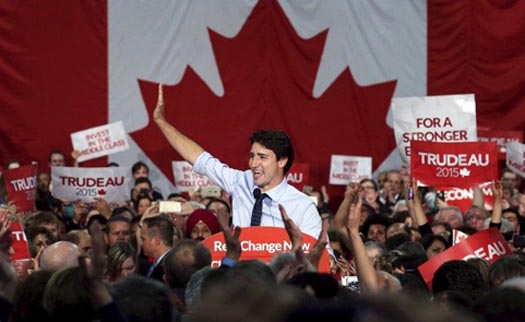
Should Justin Trudeau and the Liberals hang on to their 11 seats in British Columbia, and gain even three more, and in Alberta win even half of the 6 seats they’re projected to win, and pick up another 2 seats in Saskatchewan and Manitoba, and even half of the 10 seat gain that the party is expecting in Ontario, and a couple more seats in each of Québec and the Maritimes, that comes to an increased seat count of 17 additional seats, and a comfortable majority of 174 seats in the House of Commons.
More than likely the tale of the 2021 Canadian federal election will be told in the election’s final nine days, after the certain-to-be-raucous Thursday, September 9th Leaders’ Debate, to be held at the Canadian Museum of History in Gatineau, Québec, to be moderated by no nonsense journalists Shachi Kurl, currently President of the Angus Reid Institute, with the participation of some of our country’s finest journalists, including the incomparable Rosemary Barton (CBC News), Melissa Ridgen (APTN News), Evan Solomon (CTV News), and Mercedes Stephenson (Global News).
The Curse of Politics podcast for Thursday, August 19, 2021.
